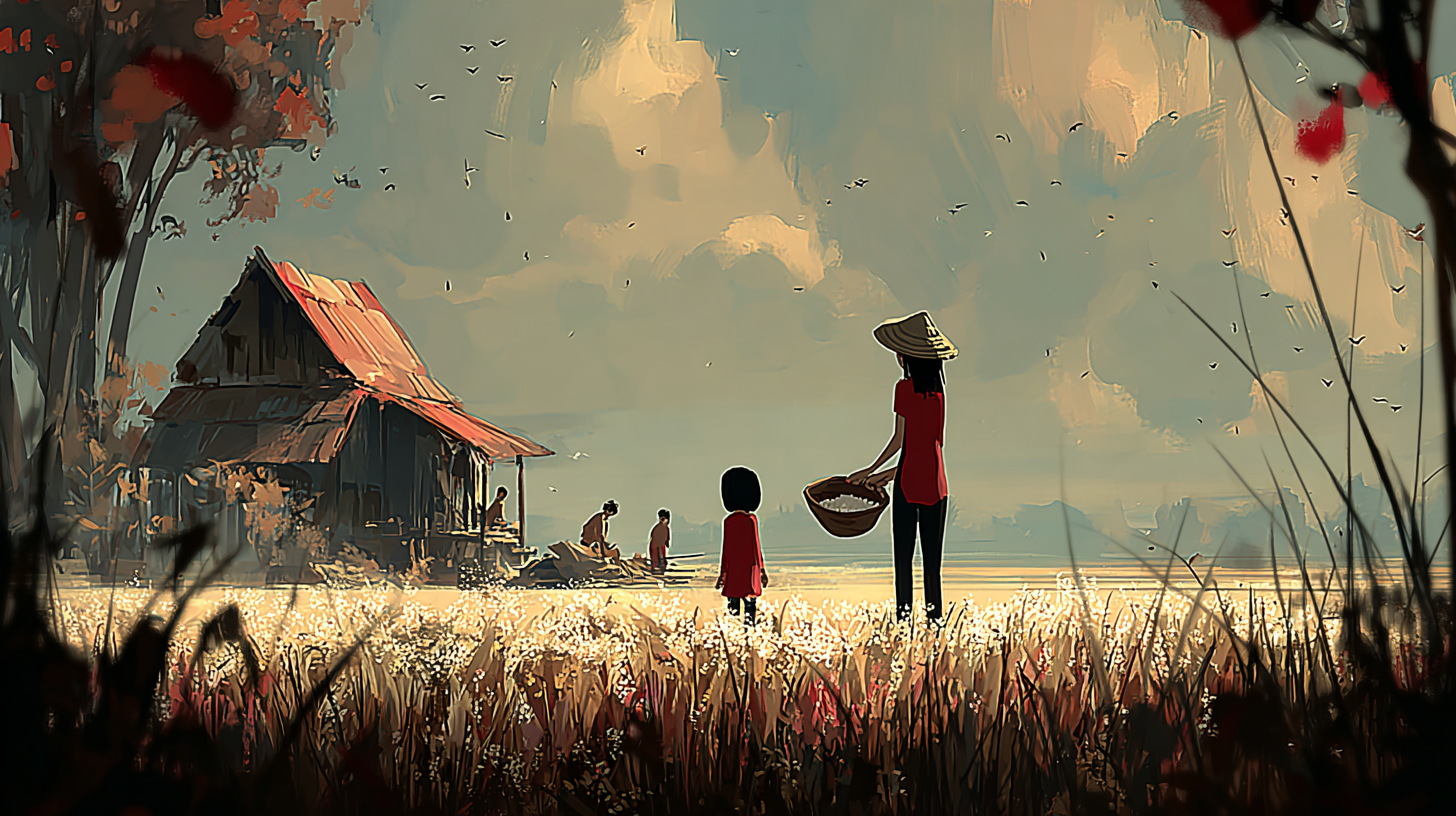“Rice” means the grain we eat, either cooked or uncooked.
「rice」は、炊く前の米や、炊いたご飯のことを指す言葉です。
以下は英単語 “rice” に関するストーリー型学習コンテンツです。まずは大枠の意味を理解して最後の文章で確認しましょう。
主な意味(main meaning)
| 品詞 | 意味 | 発音記号 | 英語例文 |
|---|---|---|---|
| 名詞 | 米、ライス(炊いたご飯) | /raɪs/ | I had rice and vegetables for lunch. |
語源(etymology)
「rice」は古フランス語 ris から来ており、さらにラテン語 oryza、ギリシャ語 oryza にさかのぼります。最終的にはサンスクリット語 vrīhíh に由来し、「主食となる穀物」というイメージを持っています。
類義語(synonyms)
| 類義語 | 英語例文 |
|---|---|
| grain | Grain is an important part of a balanced diet. |
| cereal | He eats cereal for breakfast every morning. |
| staple | Rice is a staple food in many Asian countries. |
| cooked rice | She packed some cooked rice in the lunchbox. |
反義語(antonyms)
| 反義語 | 英語例文 |
|---|---|
| meat | He prefers meat to rice in his meals. |
| bread | In some countries, bread is eaten instead of rice. |
コロケーション(collocations)
| コロケーション | 英語例文 |
|---|---|
| steamed rice | We served the curry with steamed rice. |
| bowl of rice | He ate a bowl of rice with miso soup. |
| rice cooker | I bought a new rice cooker last week. |
| rice field | The farmers worked hard in the rice field. |
| rice and beans | They made rice and beans for dinner. |
2項表現(binomials)
| 2項表現 | 英語例文 |
|---|---|
| rice and curry | I love eating rice and curry on cold days. |
| meat and rice | She cooked meat and rice for her family. |
英語ストーリー(english story)
Title: A Day in the Rice Field
Mina lives in a small town in Japan. Her family owns a rice field near their house. Every autumn, Mina and her parents work together to harvest the rice. They wake up early, wear old clothes, and walk to the field with their tools.
One day, Mina invited her friend Lisa, who is from America, to help. Lisa had never been to a rice field before. She was surprised to learn how much work it takes to grow and harvest rice.
After working for a few hours, they sat under a tree and had lunch. Mina’s mother had packed a bowl of rice, grilled fish, and vegetables. Lisa said, “This is so delicious! I usually eat cereal for breakfast, but I really like this Japanese lunch.” Mina smiled and said, “In Japan, rice is a staple food.”
Later, they talked about different kinds of food. Lisa said, “In my country, we often eat meat and bread.” Mina replied, “Here, we usually eat rice and curry or rice and beans.”
At home, Mina showed Lisa their rice cooker and explained how it worked. Lisa was impressed. “I want to buy a rice cooker when I get home,” she said.
That night, Lisa wrote in her journal: “Today, I learned that grain like rice takes hard work to produce. I respect farmers more now.”
和訳
タイトル:米作りの一日
ミナは日本の小さな町に住んでいます。家の近くには、家族が所有する**rice field(田んぼ)があります。毎年秋になると、ミナと両親は一緒にrice(米)**を収穫します。彼らは早起きして、古い服を着て、道具を持って田んぼに向かいます。
ある日、ミナはアメリカ出身の友達リサを手伝いに誘いました。リサは**rice field(田んぼ)**に来たことがありませんでした。**rice(米)**を育てて収穫するのに、これほど多くの作業が必要だと知って驚きました。
数時間働いた後、彼らは木の下で昼食をとりました。ミナの母は、bowl of rice(ご飯)、焼き魚、野菜をお弁当に入れてくれていました。リサは「これ、とてもおいしいね!私は普段は朝食に**cereal(シリアル)を食べるけど、この日本のランチすごく好き!」と言いました。ミナは笑って「日本ではrice is a staple(米が主食)**なんだよ」と答えました。
その後、二人は食文化について話しました。リサは「私の国では、よく**meat and bread(肉とパン)**を食べるの」と言い、ミナは「こっちでは、**rice and curry(ご飯とカレー)やrice and beans(ご飯と豆)**を食べるよ」と答えました。
家に帰ると、ミナはリサに**rice cooker(炊飯器)**を見せて、使い方を説明しました。リサは感心して、「帰国したら私も炊飯器を買いたいな」と言いました。
その夜、リサは日記にこう書きました。「今日は、**grain(穀物)**である米を作るには大変な努力が必要だと学びました。農家の人々をもっと尊敬するようになりました。」
Q&A
- Q「rice」は生米にも炊いたご飯にも使えるの?
- A
はい、その通りです。文脈によって意味が変わります。たとえば「I bought some rice」は「米を買った」という意味になり、「I ate some rice」は「ご飯を食べた」という意味になります。
- Q「grain」と「rice」の違いは何?
- A
「grain」は「穀物」全体を指す言葉で、「rice(米)」はその中の一つの種類です。他には「wheat(小麦)」や「barley(大麦)」などもgrainの仲間です。
- Q「staple food」ってどういう意味?
- A
「staple food」は「主食」という意味で、その地域でよく食べられている基本の食べ物を指します。日本では「rice(米)」、ヨーロッパでは「bread(パン)」などが主食です。
- Q「rice cooker」って何?
- A
「rice cooker」は「炊飯器」のことです。水とお米を入れてスイッチを押すだけで、ご飯を簡単に炊くことができます。
- Q「rice and beans」はどこの料理?
- A
「rice and beans(ご飯と豆)」は、ラテンアメリカやカリブ海の地域でよく食べられている料理です。栄養バランスが良く、安くておいしい家庭料理として人気があります。



コメント